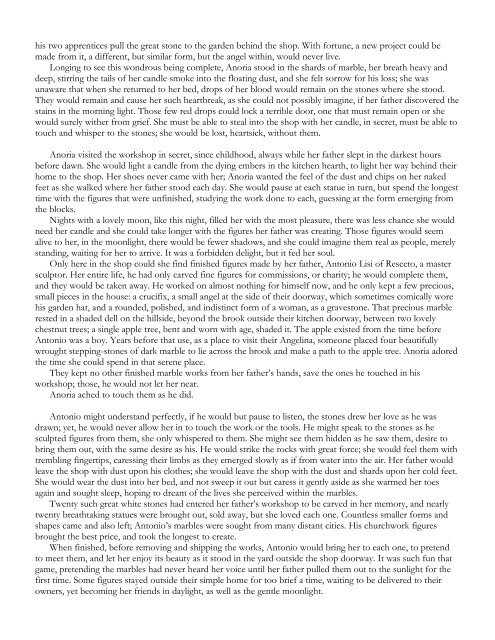Volume Three - WordPress.com — Get a Free Blog Here
Volume Three - WordPress.com — Get a Free Blog Here
Volume Three - WordPress.com — Get a Free Blog Here
Create successful ePaper yourself
Turn your PDF publications into a flip-book with our unique Google optimized e-Paper software.
his two apprentices pull the great stone to the garden behind the shop. With fortune, a new project could be<br />
made from it, a different, but similar form, but the angel within, would never live.<br />
Longing to see this wondrous being <strong>com</strong>plete, Anoria stood in the shards of marble, her breath heavy and<br />
deep, stirring the tails of her candle smoke into the floating dust, and she felt sorrow for his loss; she was<br />
unaware that when she returned to her bed, drops of her blood would remain on the stones where she stood.<br />
They would remain and cause her such heartbreak, as she could not possibly imagine, if her father discovered the<br />
stains in the morning light. Those few red drops could lock a terrible door, one that must remain open or she<br />
would surely wither from grief. She must be able to steal into the shop with her candle, in secret, must be able to<br />
touch and whisper to the stones; she would be lost, heartsick, without them.<br />
Anoria visited the workshop in secret, since childhood, always while her father slept in the darkest hours<br />
before dawn. She would light a candle from the dying embers in the kitchen hearth, to light her way behind their<br />
home to the shop. Her shoes never came with her; Anoria wanted the feel of the dust and chips on her naked<br />
feet as she walked where her father stood each day. She would pause at each statue in turn, but spend the longest<br />
time with the figures that were unfinished, studying the work done to each, guessing at the form emerging from<br />
the blocks.<br />
Nights with a lovely moon, like this night, filled her with the most pleasure, there was less chance she would<br />
need her candle and she could take longer with the figures her father was creating. Those figures would seem<br />
alive to her, in the moonlight, there would be fewer shadows, and she could imagine them real as people, merely<br />
standing, waiting for her to arrive. It was a forbidden delight, but it fed her soul.<br />
Only here in the shop could she find finished figures made by her father, Antonio Lisi of Resceto, a master<br />
sculptor. Her entire life, he had only carved fine figures for <strong>com</strong>missions, or charity; he would <strong>com</strong>plete them,<br />
and they would be taken away. He worked on almost nothing for himself now, and he only kept a few precious,<br />
small pieces in the house: a crucifix, a small angel at the side of their doorway, which sometimes <strong>com</strong>ically wore<br />
his garden hat, and a rounded, polished, and indistinct form of a woman, as a gravestone. That precious marble<br />
rested in a shaded dell on the hillside, beyond the brook outside their kitchen doorway, between two lovely<br />
chestnut trees; a single apple tree, bent and worn with age, shaded it. The apple existed from the time before<br />
Antonio was a boy. Years before that use, as a place to visit their Angelina, someone placed four beautifully<br />
wrought stepping-stones of dark marble to lie across the brook and make a path to the apple tree. Anoria adored<br />
the time she could spend in that serene place.<br />
They kept no other finished marble works from her father’s hands, save the ones he touched in his<br />
workshop; those, he would not let her near.<br />
Anoria ached to touch them as he did.<br />
Antonio might understand perfectly, if he would but pause to listen, the stones drew her love as he was<br />
drawn; yet, he would never allow her in to touch the work or the tools. He might speak to the stones as he<br />
sculpted figures from them, she only whispered to them. She might see them hidden as he saw them, desire to<br />
bring them out, with the same desire as his. He would strike the rocks with great force; she would feel them with<br />
trembling fingertips, caressing their limbs as they emerged slowly as if from water into the air. Her father would<br />
leave the shop with dust upon his clothes; she would leave the shop with the dust and shards upon her cold feet.<br />
She would wear the dust into her bed, and not sweep it out but caress it gently aside as she warmed her toes<br />
again and sought sleep, hoping to dream of the lives she perceived within the marbles.<br />
Twenty such great white stones had entered her father’s workshop to be carved in her memory, and nearly<br />
twenty breathtaking statues were brought out, sold away, but she loved each one. Countless smaller forms and<br />
shapes came and also left; Antonio’s marbles were sought from many distant cities. His churchwork figures<br />
brought the best price, and took the longest to create.<br />
When finished, before removing and shipping the works, Antonio would bring her to each one, to pretend<br />
to meet them, and let her enjoy its beauty as it stood in the yard outside the shop doorway. It was such fun that<br />
game, pretending the marbles had never heard her voice until her father pulled them out to the sunlight for the<br />
first time. Some figures stayed outside their simple home for too brief a time, waiting to be delivered to their<br />
owners, yet be<strong>com</strong>ing her friends in daylight, as well as the gentle moonlight.







